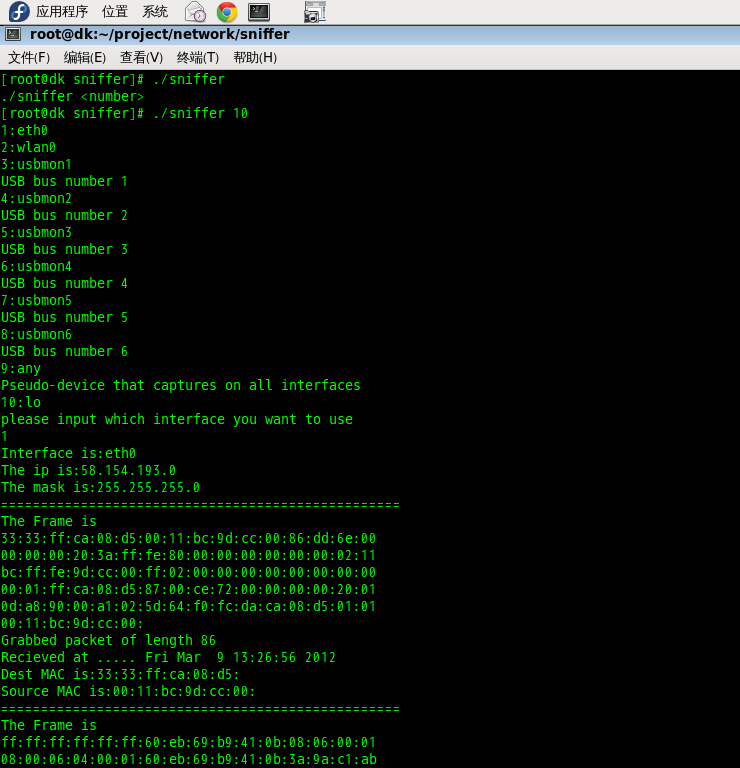(1)获取网络接口名字和掩码等信息
(2)捕获数据包(单个数据包和多个数据包两种情况)
(3)以太网数据报捕获
(4)ARP数据包捕获
(5)IP数据包捕获
(6)TCP数据包捕获
(7)UDP数据包捕获
(8)ICMP数据包捕获
环境fedora13,vim,gcc
|
1 2 3 4 5 6 7 8 9 10 11 12 13 14 15 16 17 18 19 20 21 22 23 24 25 26 27 28 29 30 31 32 33 34 35 36 37 38 39 40 41 42 43 44 45 46 47 48 49 50 51 52 53 54 55 56 57 58 59 60 61 62 63 64 65 66 67 68 69 70 71 72 73 74 75 76 77 78 79 80 81 82 83 84 85 86 87 88 89 90 91 92 93 94 95 96 97 98 99 100 101 102 103 104 105 106 107 108 109 110 111 112 113 114 115 116 117 118 119 120 121 122 123 124 125 126 127 128 129 130 131 132 133 134 135 136 137 138 139 140 141 142 143 144 145 146 147 148 149 150 151 152 153 154 155 156 157 158 159 160 161 162 163 164 165 166 167 168 169 170 171 172 173 174 175 176 177 178 179 180 181 182 183 184 185 186 187 188 189 190 191 192 193 194 195 196 197 198 199 200 201 202 203 204 205 206 207 208 |
#include<stdio.h> #include<string.h> #include<pcap.h> #include<sys/socket.h> #include<netinet/in.h> #include<netinet/if_ether.h> #include<netinet/ip.h> #include<netinet/udp.h> #include<netinet/tcp.h> #include<netinet/ip_icmp.h> #define max 1024 /* typedef u_int32_t int_addr_t; struct in_addr { int_addr_t s_addr; };*/ int call(u_char *argument,const struct pcap_pkthdr* pack,const u_char *content) { int m=0,n; const u_char *buf,*iphead; u_char *p; struct ether_header *ethernet; struct iphdr *ip; struct tcphdr *tcp; struct udphdr *udp; struct icmphdr *icmp; buf=content; printf("==================================================\n"); printf("The Frame is \n"); while(m< (pack->len)) { printf("%02x",buf[m]); m=m+1; if(m%16==0) printf("\n"); else printf(":"); } printf("\n"); printf("Grabbed packet of length %d\n",pack->len); printf("Recieved at ..... %s",ctime((const time_t*)&(pack->ts.tv_sec))); // printf("Ethernet address length is %d\n",ETHER_HDR_LEN); ethernet=(struct ether_header *)content; p=ethernet->ether_dhost; n=ETHER_ADDR_LEN; printf("Dest MAC is:"); do{ printf("%02x:",*p++); }while(--n>0); printf("\n"); p=ethernet->ether_shost; n=ETHER_ADDR_LEN; printf("Source MAC is:"); do{ printf("%02x:",*p++); }while(--n>0); printf("\n"); if(ntohs(ethernet->ether_type)==ETHERTYPE_IP) { printf("It's a IP packet\n"); ip=(struct iphdr*)(content+14); printf("IP Version:%d\n",ip->version); printf("TTL:%d\n",ip->ttl); printf("Source address:%s\n",inet_ntoa(ip->saddr)); printf("Destination address:%s\n",inet_ntoa(ip->daddr)); printf("Protocol:%d\n",ip->protocol); switch(ip->protocol) { case 6: printf("The Transport Layer Protocol is TCP\n"); tcp=(struct tcphdr*)(content+14+20); printf("Source Port:%d\n",ntohs(tcp->source)); printf("Destination Port:%d\n",ntohs(tcp->dest)); printf("Sequence Number:%u\n",ntohl(tcp->ack_seq)); break; case 17: printf("The Transport Layer Protocol is UDP\n"); udp=(struct udphdr*)(content+14+20); printf("Source port:%d\n",ntohs(udp->source)); printf("Destination port:%d\n",ntohs(udp->dest)); break; case 1: printf("The Transport Layer Protocol is ICMP\n"); icmp=(struct icmphdr*)(content+14+20); printf("ICMP Type:%d\n", icmp->type); switch(icmp->type) { case 8: printf("ICMP Echo Request Protocol\n"); break; case 0: printf("ICMP Echo Reply Protocol\n"); break; default: break; } break; default: break; } /* if(*iphead==0x45) { printf("Source ip :%d.%d.%d.%d\n",iphead[12],iphead[13],iphead[14],iphead[15]); printf("Dest ip :%d.%d.%d.%d\n",iphead[16],iphead[17],iphead[18],iphead[19]); }*/ // tcp= (struct tcp_header*)(iphead); // source_port = ntohs(tcp->tcp_source_port); // dest_port = ntohs(tcp->tcp_destination_port); } else if(ntohs (ethernet->ether_type) == ETHERTYPE_ARP) { printf("This is ARP packet.\n"); iphead=buf+14; if (*(iphead+2)==0x08) { printf("Source ip:\t %d.%d.%d.%d\n",iphead[14],iphead[15],iphead[16],iphead[17]); printf("Dest ip:\t %d.%d.%d.%d\n",iphead[24],iphead[25],iphead[26],iphead[27]); printf("ARP TYPE: %d (0:request;1:respond)\n",iphead[6]); } } return 0; } int main(int argc,char *argv[]) { if(argc!=2) { printf("%s <number>\n",argv[0]); return 0; } pcap_t *handle; pcap_if_t *alldev; pcap_if_t *p; char error[100]; struct in_addr net_ip_addr; struct in_addr net_mask_addr; struct ether_header *ethernet; char *net_ip_string; char *net_mask_string; char *interface; u_int32_t net_ip; u_int32_t net_mask; struct pcap_pkthdr pack; const u_char *content; int i=0,num; if(pcap_findalldevs(&alldev,error)==-1) { printf("find all devices is error\n"); return 0; } for(p=alldev;p;p=p->next) { printf("%d:%s\n",++i,p->name); if(p->description) { printf("%s\n",p->description); } } if(i==1) interface=p->name; else { printf("please input which interface you want to use\n"); scanf("%d",&num); if(num<1||num>i) { printf("interface is unavillible\n"); return 0; } for(p=alldev,i=1;i<=num;p=p->next,i++) interface=p->name; } /* if((interface=pcap_lookupdev(error))==NULL) { printf("%s\n",error); return 0; }*/ if((handle=pcap_open_live(interface,max,1,0,error))==NULL) { printf("%s\n",error); return 0; } if(pcap_lookupnet(interface,&net_ip,&net_mask,error)==-1) { printf("%s\n",error); return 0; } printf("Interface is:%s\n",interface); net_ip_addr.s_addr=net_ip; net_ip_string=inet_ntoa(net_ip_addr); printf("The ip is:%s\n",net_ip_string); net_mask_addr.s_addr=net_mask; net_mask_string=inet_ntoa(net_mask_addr); printf("The mask is:%s\n",net_mask_string); pcap_loop(handle,atoi(argv[1]),call,NULL); pcap_freealldevs(alldev); return 1; } |

发表评论
要发表评论,您必须先登录。